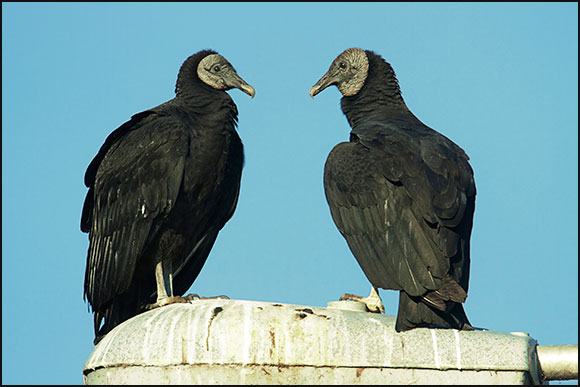
Black Vultures on the Rise, Growing Problem for Livestock Producers
Black vultures have been known to target newborn calves.
by Tracy Turner, Ohio State University
Livestock producers beware — black vultures are on the hunt, and they aren’t just looking for dead animals.
These migratory birds are known to attack and eat live animals, too.
The birds have become a problem for many Ohio livestock producers in recent years, said Stan Smith, an Ohio State University (OSU) Extension program assistant in agriculture and natural resources. Black vultures have been a growing problem for Ohio livestock producers during the past 15 years.
“Folks in several areas across the state have reported having problems with black vultures attacking small animals,” he said. “In some cases, the birds have been known to attack newborn calves during birth while they are still in the cow’s birth canal before the animal is even completely out.
“Unlike the more docile turkey vultures, which are more timid and feed on dead animal carcasses, black vultures are more aggressive. They’ve been known to target and kill small live animals, including lambs, calves, goats, groundhogs and other wild animals.”
For livestock producers, this is an issue that is even more prevalent during calving, which for most is in spring or fall, Smith said.
“These animals are hungry year-round,” he said. “If they can’t find something dead to eat, they will attack live animals — anything outdoors.”
Black vultures, which have black heads and white tips on the undersides of their wings, are easily distinguished from turkey vultures, which have red heads as adults, are larger and have longer wings. Immature turkey vultures have blackish-gray heads.
Because black vultures are migratory, the Migratory Bird Treaty Act of 1918 protects them. So producers need a Migratory Bird Depredation Permit in order to take, capture or kill the birds, Smith said.
The permits, which typically cost $100 from the U.S. Fish and Wildlife Service, can be obtained for free by livestock producers who are applying for the permit for the first time, he said.
“Another option producers have to deal with black vultures is to use the birds they kill after they’ve gotten their permit and use it as an effigy to keep other vultures away,” Smith said. “Producers can also hire a taxidermist to stuff the dead vultures that can be hung to resemble a dead bird to keep other vultures away.”

Editor’s Note: Tracy Turner is a technical editor covering the topics of production agriculture and farm science review for Ohio State University’s College of Food, Agricultural and Environmental Sciences.






